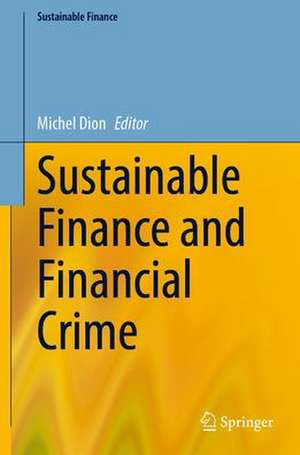Sustainable Finance and Financial Crime: Sustainable Finance
Editat de Michel Dionen Limba Engleză Hardback – 28 iun 2023
Din seria Sustainable Finance
- 20%
 Preț: 875.94 lei
Preț: 875.94 lei - 17%
 Preț: 395.20 lei
Preț: 395.20 lei - 17%
 Preț: 493.46 lei
Preț: 493.46 lei - 17%
 Preț: 393.97 lei
Preț: 393.97 lei - 17%
 Preț: 365.82 lei
Preț: 365.82 lei - 15%
 Preț: 592.44 lei
Preț: 592.44 lei -
 Preț: 401.42 lei
Preț: 401.42 lei - 18%
 Preț: 771.53 lei
Preț: 771.53 lei - 15%
 Preț: 588.18 lei
Preț: 588.18 lei -
 Preț: 377.57 lei
Preț: 377.57 lei - 18%
 Preț: 776.09 lei
Preț: 776.09 lei - 18%
 Preț: 773.41 lei
Preț: 773.41 lei - 15%
 Preț: 696.68 lei
Preț: 696.68 lei - 15%
 Preț: 699.93 lei
Preț: 699.93 lei - 15%
 Preț: 468.90 lei
Preț: 468.90 lei
Preț: 1118.45 lei
Preț vechi: 1363.96 lei
-18% Nou
Puncte Express: 1678
Preț estimativ în valută:
214.02€ • 223.91$ • 177.78£
214.02€ • 223.91$ • 177.78£
Carte tipărită la comandă
Livrare economică 03-17 aprilie
Preluare comenzi: 021 569.72.76
Specificații
ISBN-13: 9783031287510
ISBN-10: 3031287517
Ilustrații: XVI, 374 p. 43 illus., 36 illus. in color.
Dimensiuni: 155 x 235 mm
Greutate: 0.72 kg
Ediția:2023
Editura: Springer International Publishing
Colecția Springer
Seria Sustainable Finance
Locul publicării:Cham, Switzerland
ISBN-10: 3031287517
Ilustrații: XVI, 374 p. 43 illus., 36 illus. in color.
Dimensiuni: 155 x 235 mm
Greutate: 0.72 kg
Ediția:2023
Editura: Springer International Publishing
Colecția Springer
Seria Sustainable Finance
Locul publicării:Cham, Switzerland
Cuprins
Part 1: Sustainable Finance and the Challenge of Developing Ethical Leadership.- Chapter 1. The Role of Impact Finance in Targeting Social Justice.- Chapter 2. The Impact of Financial Institutions on Sustainable Value Creation in Companies’ Business Models.- Chapter 3. Sustainable Finance, Banks, Sustainability, and Corporate Financial Performance.- Chapter 4. International Informal Capital Flows and Sustainable Finance: China’s Regulatory Approach.- Chapter 5. Sustainable Finance and Bitcoin: the Nature of Distributed Ledger Technology and Related ‘coins’ and Assets.- Chapter 6. Ethical Leadership as a Prerequisite for Sustainable Development, Sustainable Finance, and Esg Reporting.- Chapter 7. Ethical Leadership and Ethical Organizational Culture: Two Pillars for Fighting Against Corruption in the Organizations.- Chapter 8. The Development of Sustainable Finance and the Axiological Strategies Against Corruption in Organizations: Enhancing Virtues or Emphasizing Moral Duties?.- Part 2: Sustainable Finance and the Challenge of Preventing Financial Crime.- Chapter 9. Corruption and Transactional Crime: Building Up Effective Accountable Inclusive and Transparent Institutions as Ground for Sustainable Finance.- Chapter 10. Discursive Justification of Corruption: a Complex and Multifaceted Process.- Chapter 11. Financial Crime in OTC Markets.- Chapter 12. Does Fiscal Pressure Influence Shadow Economy? A Panel Data Analysis for the OECD Countries.- Chapter 13. A Bidirectional Causality Between Shadow Economy and Economic and Sustainable Development.- Chapter 14. Sustainable Finance and the Role of Corporate Governance in Preventing Economic Crimes.- Part 3: Sustainable Finance and the Challenge of Combating Financial Crime.- Chapter 15. The Financial Fraud of the German Fintech Company Wirecard: Structural Causes and Failures of the Supervisory Authorities.- Chapter 16. Reducing Financial Crime Convenience for Sustainable Finance. A Case Study of Danske Bank in Estonia.- Chapter 17. How the Battle Against Cybercrime Strengthens Sustainable Finance.- Chapter 18. Terrorism Financing, the United Kingdom, and the Financial Action Task Force: A Series of Omissions or Missed Opportunities?.
Notă biografică
Michel Dion is Adjunct Professor from the École de gestion, Université de Sherbrooke (Québec, Canada), since January 2023 (Retired Professor). He has been Chairholder of the CIBC Research Chair on Financial Integrity (2010-2022) and Chair of the Department of Management and Human Resources Management (2017-2022) at the École de gestion, Université de Sherbrooke (Québec, Canada). His main fields of research include business ethics, ethical leadership, financial crime, corruption, management, spirituality, and organization. His research works have appeared in the Humanistic Management Journal, Leadership & Organization Development Journal, Business Ethics: A European Review, Social Responsibility Journal, Research in Ethical Issues in Organi- zations, the International Journal of Social Economics, and the International Journal of Organi- zational Analysis. His latest books include: Worldviews, Ethics, and Organizational Life(Springer, 2021); Financial Crime and Existential Philosophy (Springer, 2014). With David Weisstub and Jean-Loup Richet, he was co-editor of Financial Crimes: Psychological, Technological, and Ethical Issues (Springer, 2016). With Edward Freeman and Sergiy Dmytriyev, he was co-editor of Humanizing Business: What Humanities Can Say to Business (Springer, 2022). With Moses Pava, he was co-editor of The Spirit of Conscious Capitalism: Contributions of World Religions and Spiritualities (Springer, 2022).
Textul de pe ultima copertă
Sustainable finance is a holistic approach to the sustainability development goals (SDG), so that the interdependence between environmental, social, and governance issues is unveiled. Sustainable finance takes into account the various challenges following from social change and sustainability, the evolution of capital markets, and the development of efficient risk management practices. Governance issues are an integral part of sustainable finance. However, academic literature has generally neglected to consider strategies to prevent and fight financial crimes as a crucial component of sustainable finance. The aim of this book is to focus on the interconnectedness between sustainable finance and preventing/fighting financial crime, not only as a crucial governance issue, but also as a deep challenge for social and even environmental issues. There is no really sustainable finance without developing strong and efficient means to fight financial crimes.
Caracteristici
Presents the interconnectedness between sustainable finance, social justice, and capital markets Describes how prevention strategies against financial crime could enhance good governance Discusses how fighting financial crimes through regulatory mechanisms could strengthen sustainable finance
